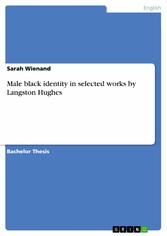Suchen und Finden
Male black identity in selected works by Langston Hughes
Bachelor Thesis from the year 2013 in the subject English Language and Literature Studies - Literature, grade: 2,0, University of Wuppertal, language: English, abstract: Throughout many years, African Americans have been struggling in defining and constructing their identity, especially male African Americans had problems to build up self-esteem and to reassure their cultural masculinity, which was undermined by white men. Not only does history confirm this struggle but so does literature. In liter-ature, many different aspects about male black identity and their struggle for identity can be found. However, one of the most important authors in this context is Langston Hughes. In his works, he focuses on the urban life of African Americans and the problems they had to face because of oppression and racism evoked by white Americans. Furthermore, Hughes wanted 'to record and interpret the lives of the common black folk, their thoughts and habits and dreams, their struggle for political freedom and economic well-being' (Jemie: 1). By doing so in his writings, he took this struggle for and negotiation of racial identity to another level in developing a unique form of expression. In this thesis, I will concentrate on three major works by Langston Hughes: Mulatto: A Tragedy of the Deep South, 'Simple speaks his mind' and Not without laughter. All three texts display emotional conflicts and the struggle for identity of African American men with 'simplicity and depth' (Tidwell: 3). Furthermore, all three pro-tagonists have a rather low status in society, which contributes, according to Lang-ston Hughes, to their authenticity since they are the ones who represent the African American and thus their pursuit of identity (cf. Tidwell: 3). Moreover, I am going to begin with a general overview of the male black identity and the struggle for an African American male perspective in a culture which is dom-inated by white American men. Afterwards, I will transfer this concept of male black identity to the three selected works by Langston Hughes and analyse in how far these texts engage in constructing their main characters in similar terms. The next significant aspect will be concerned with the question in how far education is perceived as a part of this male black identity and in how far it supports the development of an African American male identity. When having discussed the influence of education in the protagonists' male black identity development, I am going to turn to the topic of identity crisis. [...]
Alle Preise verstehen sich inklusive der gesetzlichen MwSt.








